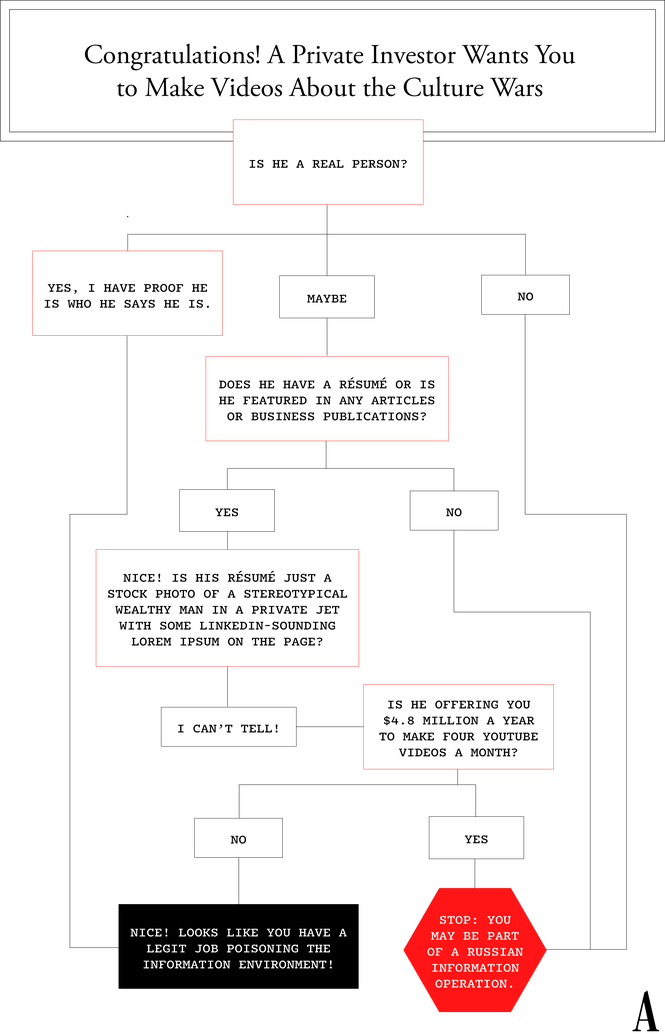Don’t Forget to Like and подпишись!
7 min read
Perhaps the most accurate cliché is that if a deal appears too good to be true, then it probably is.
To wit: If a “private investor” of unknown origin approaches you through an intermediary, offering you $400,000 a month to make “four weekly videos” for a politically partisan website and YouTube page, you may want to attempt to follow the money to make certain you’re not being paid by a foreign government as a propagandist. And if you do attempt a bit of due diligence and ask after the identity of your private investor, you might want to double-check that he or she is a real person. For example, if your intermediary sends you a hastily Photoshopped résumé featuring a stock photo of a well-coiffed man looking wistfully out the window of a private jet, it is possible that the “accomplished finance professional” who is “deeply engaged in business and philanthropy, leveraging skills and resources to drive positive impact” may, in fact, be a fake man with a fake name.
Now, I am not a lawyer, and this is not a legal perspective. But I do have many years of professional work experience in media and access to subscription-tier flowchart software to offer some advice:

You may be thinking that such data visualization is unnecessary—that of course a YouTuber wouldn’t blindly accept $4.8 million a year and a $100,000 signing bonus to make 208 video units of political propaganda for a little-known benefactor. I, too, was of this opinion until I read Wednesday’s unsealed indictment of Kostiantyn Kalashnikov and Elena Afanasyeva, two employees of RT, a Russian state-controlled media outlet, who, according to the Department of Justice, allegedly “deployed nearly $10 million to publish RT-curated content … through a Tennessee-based online content creation company.”
Although the indictment does not mention the company by name, details in the document, including the website description—“a network of heterodox commentators that focus on Western political and cultural issues”—match the description of Tenet Media, a company founded in 2022 by the right-wing Canadian YouTuber Lauren Chen and her husband, Liam Donovan. The indictment alleges that the company’s founders were aware that their benefactors were Russian (less clear is whether they understood their affiliations with RT) and that the pair accepted the money and hired numerous high-profile MAGA influencers to create political videos for the site, without disclosing to the influencers or their audience where the funding was coming from. (Chen has declined to comment on the case.)
Among the popular pro-Trump influencers embroiled in this state-media-funded fiasco are Dave Rubin, Benny Johnson, and Tim Pool, all of whom had contracts with Tenet Media. The indictment alleges that the online personalities were unaware of Russian involvement in Tenet’s operation. Johnson, Rubin, and Pool all issued public statements on Wednesday alleging that they had been deceived by Tenet and that they are “victims” of a foreign-influence operation. Yesterday, YouTube removed the implicated channels from its site, and Tenet Media reportedly went out of business.
The indictment’s revelations are notable as further evidence of Russia’s repeated attempts to sow division in the American electorate in a contentious presidential-election cycle, as my colleague Tom Nichols wrote yesterday. It describes an evolution in the tactics of Russian information warfare, one where, instead of creating fake accounts or elaborate networks of bots and paid trolls, state actors are merely tapping into an existing community of already popular shock jocks who may not ask questions about where the money is coming from. But perhaps more important, the indictment offers a clear look at the state of the far-right media ecosystem as a patchwork of content mercenaries—a conglomeration of creators so motivated by greed and online engagement that they are a natural fit to become Russian media’s useful idiots. Who needs a troll farm when you can rent trolls with their own built-in audiences?
“It’s striking that the content that many of those at the top of the MAGA media game are pushing to voters is so closely aligned with the objectives of Russian state media that RT hardly had to intervene at all,” Jared Holt, a senior research analyst who studies the far right at the Institute for Strategic Dialogue think tank, told me. “It was astonishingly easy.”
The indictment, which reads less like a John le Carré novel and more like a Coen-brothers screenplay, suggests that the influencers were keen to accept their exorbitant contracts. According to the document, only one unnamed influencer had any reservations about their benefactor, a supposed businessman named “Eduard Grigoriann.” As the indictment notes, even though there was no evidence of his existence, even on Google Search, the influencer appeared mostly satisfied by the fake résumé from one of Grigoriann’s representatives that a Tenet founder shared—with one concern. It wasn’t the vague, LinkedIn-style lorem-ipsum language, nor was it the embedded photo of a private jet. No: The influencer was troubled by a mention in the résumé that Grigoriann had a focus on “advocating for social justice causes.” Nevertheless, he signed the lucrative deal.
Make no mistake: Even though the details are absurd, this was a Russian propaganda attack on Americans. What’s less clear is whether their output was worth the investment. Tenet published about 2,000 YouTube videos, which gained more than 16 million views—roughly 8,000 views per video. Afanasyeva, according to the indictment, appeared frustrated with the influencers, who seemed more interested in promoting their own brands than sharing Tenet’s raw content on X and other platforms. “I know this is not an obligation, but we are falling behind with numbers,” Afanasyeva wrote to one of the company’s founders.
That some of MAGA world’s biggest influencers should find themselves connected to a Russian disinformation operation makes perfect sense. Their incessant posts and rants, attacking Democrats and fearmongering about migrants, transgender Americans, and “wokeness” run amok, track with a brand of divisive rhetoric that foreign governments wish to inject into the bloodstream of American media. “This idea that Americans are deeply divided, that things are getting worse, that you can’t trust the government—the things that seek to destabilize American society—are a natural fit because of the content,” Holt told me.
One does not just become a useful idiot for Russian state media only by being greedy. Should the allegations be proved true, the incident will serve as a cautionary tale of what happens when you chase and optimize for engagement at every available opportunity. Pool and Rubin, for example, made their names as disaffected liberals who came to the realization that their peers had evolved away from rational liberalism toward dangerous leftist ideological values. This notion, that lifelong moderate liberals have no choice these days but to support right-wing causes, is a common trope among far-right activists (see: Elon Musk). To defect to the right is a proven lucrative path and, just as important, a way to find a highly engaged audience who’s ready to leap to your defense online. Johnson, an alum of BuzzFeed, Independent Journal Review, The Daily Caller, and Blaze Media, is also an inveterate poster and engagement optimizer whose apparent quest for audience has led him deeper down the pro-Trump rabbit hole. (As a point of disclosure: Johnson and I overlapped at BuzzFeed News, before he was fired for plagiarism.) His online biography proudly declares that, “with +5 billion views and +7 million followers across his social media platforms, he is a veteran when it comes to viral content!”
This type of engagement-based worldview—the constant optimizing for maximum attention, regardless of substance—is inherently corrupting, a fact that the Kremlin appears to understand. According to a recent FBI affidavit, a Kremlin-linked propaganda organization has allegedly identified 2,800 digital influencers globally as possible candidates to promote pro-Russian messages. But the downsides of chasing audiences and platform incentives are not limited to information operations, either. Tim Gionet, another BuzzFeed alum, went to jail for his role in storming the Capitol on January 6, 2021, and streaming it live for likes and follows. One of my former colleagues once described Gionet to The New York Times as having politics “guided by platform metrics … You always think that evil is going to come from movie villain evil, and then you’re like—oh no, evil can just start with bad jokes and nihilistic behavior that is fueled by positive reinforcement on various platforms.”
This same reinforcement mechanism is what leads Pool, Rubin, Johnson, and Tenet’s other influencers to appear unrepentant about their involvement and seemingly uninterested in any introspection about how they ended up unwittingly doing the bidding of a hostile foreign power. Instead, the group has chosen to dutifully follow the far-right-influencer playbook, which suggests that one should never apologize, and spin any accusations of wrongdoing as an opportunity to cast themselves as the victims. For those as fully captured by their audience as Pool, Rubin, and Johnson, it’s a good strategy. Their audiences, primed by past rebuttals and victim narratives, are primed to see these influencers as embattled truth tellers. Thus what would seem like awful news (being accused by the federal government of being Russia’s useful idiot) is merely another avenue for engagement.



